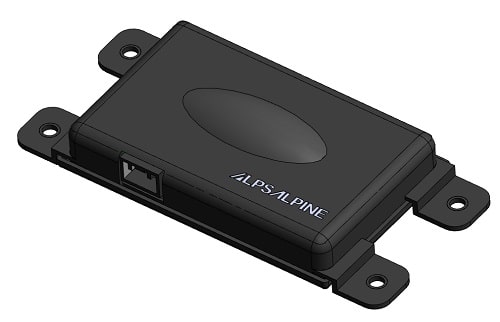This will allow the company to develop and distribute its 60 GHz millimetre-wave technology for automotive applications and others

With the receiving of construction design certification for 60GHz pulsed millimetre-wave sensors in compliance with Japan’s radio law, Alps Alpine can now mass-produce and distribute them within Japan’s domestic market as early as next year.
These pulsed millimetre-wave sensors have several automotive applications including autonomous driving, tailgate kick sensors, detection of any left-behind infants, and safe, comfortable mobility of vehicle occupants (by monitoring driver status and other conditions inside the cabin).
Outside the automotive domain, there is a wide range of potential applications, including gesture detection for smart home appliances, and for determining physiological data, such as heart and respiratory rates.
Because 60GHz offers the widest bandwidth, it enables high detection accuracy. It can also be used for a wide range of applications globally given its low level of restrictions on its use in Europe and the United States (79GHz band) for automotive sensing outside the vehicle.
For these reasons, global demand for 60GHz millimetre-wave sensors is on the rise.
Technicalities of millimetre-wave sensors
Millimetre-wave sensors are electronic components that emit radio signal frequencies within the 30GHz–300GHz band. On receiving them after reflection from objects, their position, velocity, dynamic state and other parameters get determined.
There are two types of millimetre-wave sensors: frequency-modulated continuous wave radar (FMCW) and pulsed millimetre-wave sensor. Due to the extent of the detectable range, FMCW millimetre-wave sensors have primarily been developed for detection applications on the vehicle exterior for autonomous driving functions.
The pulsed type, while detectable, has a short range. However, it consumes low power and has a compact size, along with good compatibility with other sensors (low chance of interference). The sensor’s application includes detection inside vehicle cabins and other diverse non-automotive uses.
According to a market research report by Global Information, Inc., the global millimetre-wave technology market is growing at an average annual growth rate of 20.8% and is predicted to grow to US$ 4.7 billion in 2026 from US$ 1.8 billion in 2021.
With the global millimetre-wave technology market expanding, Alps Alpine looks to harness its unique strengths in the RF field to further enhance the performance of the company’s pulsed millimetre-wave sensors, while also continuing the development of FMCW millimetre-wave technology to meet the diverse needs presented by next-generation vehicles of the CASE age.
Furthermore, development and promotion activities will be advanced to extend the application to diverse uses outside the automotive market, such as in consumer electronics and industrial equipment.
Through a broad range of millimetre-wave applications, Alps Alpine seeks to deliver solutions contributing to people’s safety, comfort and emotion.







